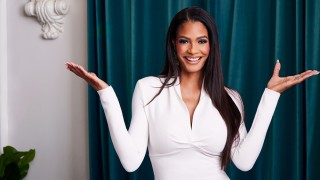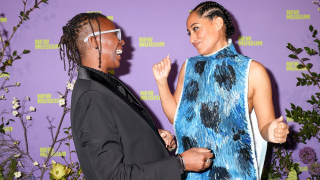When it comes to TV viewing habits, Marta Celestino isn’t much different from millions of Black people in the United States. Like many of us, she got hooked on Empire. But this Afro-Brazilian woman doesn’t live in the United States. And she can’t watch Empire on Brazilian television. So all year, she’s downloaded the series on iTunes.
“There has never been a family like Lucious’s family on Brazilian television,” Celestino says when asked why she watches the show. “This family has power. We see Lucious’s family, which is a mess, but it reflects a lot of us. We think, we dance, we hustle.”
There are so few Black people on Brazilian entertainment television that Afro-Brazilians look to American television to fill the gap.
Like many Black women in America, Thamires Assis’s favorite television show is Scandal. She loves Scandal because it features a powerful, intelligent Black woman who solves problems. But when she looks for similar characters on Brazilian entertainment television, she can’t find them. And when Afro-Brazilian people are featured on TV, it’s almost never positive.
“The Black person is always the poor one who live in slums and is never the lawyer or the successful engineer,” says Assis, a human resource analyst in São Paulo.
In a post on the Facebook group Intelectualidade Afro-brasileira (Intellectual Afro-Brazilian), Rosenildo Ferreira called for a one-day boycott of local TV shows that don’t show Afro-Brazilian people. “Let’s boycott, at least for one day, the television stations that don’t employ Afro-Brazilians,” wrote Ferreira, a journalist in São Paulo. “It will be a start.”
Brazilians must be jealous of American television. Black people are everywhere lately. Thursday is widely known as Shonda Rhimes night with Grey’s Anatomy, Scandal and How to Get Away with Murder running consecutively. Fox’s Empire just wrapped up a season in which it dominated Wednesday night ratings. TV executives are seeing diversity pay off.
And if the rise of America’s diversity in television has been boosted by high ratings and money, then Great Britain is determined to get there through brute force. All four of Britain’s main broadcasters (BBC, ITV, Channel 4, Sky) have recently unveiled diversity charters that target diversity in front and behind the camera. Senior staff at Channel 4 can earn significant bonuses if they meet diversity targets that include race, sexual preference and even disabilities. And they could lose their jobs if they don’t meet those targets.
If only that was the case in Brazil.
Brazil, like America, is one of the most diverse countries in the world. Half the country’s 200 million people are descendants of Africans. The country has the largest population of Japanese people outside of Japan itself. In São Paulo, people of Jewish and Arab descent live peacefully alongside each other.
But this diversity is hardly represented on O Globo—the country’s top television station that captures up to 40 percent of television market during weekday evenings. There are no “Black” shows running on O Globo right now. The evening novelas and series rarely feature a main Black character at all.
In January and February 2015, the most visible Black woman on O Globo was the mulata, Globeleza. Every year in the month preceding carnival, O Globo broadcasts a 50-second advertisement of a Black woman dancing samba naked with colorful, sparkly makeup on her body. (To see this promo, click here.)
Last fall, O Globo television debuted one of its most ambitious “Black” television shows: Sexo e as Negas, or Sex and the Negress in English. Modeled after Sex and the City, the series featured four Black Brazilian women living in a working-class Rio de Janeiro suburb. They’re all seeking love and better lives. Zulmaa is the curvy dark-skinned woman who sports braids, and works as the chambermaid of famous White actress. Tilde is unemployed, but the light-skinned beauty tries to garner up enough confidence to sit for the math exam to enter university. Lia is a slightly chubby 38-year-old grandma who works as a hostess in an expensive churrascaria restaurant. She just wants to find love again. Sororia is a sex-crazed cook for a Brazilian family.
“This series didn’t even try to escape the tradition of Brazilian TV that treats Black characters as stereotypes and emphasizes their subordination and inferiority as ‘natural,’ ” said Joelzito Araujo, a Brazilian filmmaker who produced a documentary about the history of Afro-Brazilians in telenovelas.
Araujo’s 2001 documentary, Denying Brazil, shows how far Afro-Brazilians have come in telenovelas and how far they have to go. In a 1969 rendition of Uncle Tom’s Cabin, a White man in blackface played the main actor. Afro-Brazilian actress Zezé Motta played Xica da Silva, a former slave who became a powerful rich woman through her lover, in a popular 1975 telenovala. The next role she received was to play a maid.
Afro-Brazilians made sure that the stereotypical Sexo e as Negas didn’t last into 2015.
When O Globo announced the series in September of last year, it was immediately met with criticism and protest, mainly from Afro-Brazilian women. Thousands of women (of varying colors) photographed themselves with a sign reading “sexo e as negas nao me representa,” and shared the images across social media networks. A Facebook page calling for a boycott of the series amassed more than 30,000 likes.
Not only were Black women disappointed by the sexual nature of the show, but they also didn’t like that all the women were in subsidiary positions to White people. Clearly the women on Sexo e as Negas didn’t have the education or power of either Olivia Pope or Annalise Keating.
“It was a miniseries that reinforced the stereotype against Black women,” says Edilene Santana dos Santos Silva, a teacher in Salvador who boycotted the series. “This stereotype was even in the name of the series.” Due to low ratings, the show was canceled in December.
And Silva isn’t anticipating Brazilian television to introduce more series with positive Afro-Brazilian characters.
“I don’t believe in changing the White Brazilian media, because this is one of the strong arms of racial domination in Brazil,” Silva says. “I believe that Blacks in Brazil needs a strong Black and independent media.”
Kiratiana Freelon is a reporter who lives in Rio de Janeiro. Find her on the Internet at kiratiana.com and @kiratiana.












